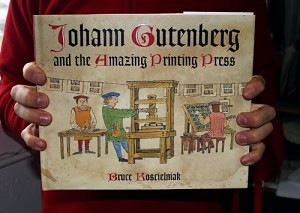 Remember when you sat at Grandma’s feet and she told you stories about the Great Depression, or what it was like to be the biggest Irish clan with 13 kids? Perhaps your stories aren’t like those, but you can relate with a few you’ve heard or have told.
Remember when you sat at Grandma’s feet and she told you stories about the Great Depression, or what it was like to be the biggest Irish clan with 13 kids? Perhaps your stories aren’t like those, but you can relate with a few you’ve heard or have told.
I promised to recant the richness of my discussion as a gift for Gregg Morris, a Twitter pal with whom I only recently made verbal connection yet trust was established long ago on Twitter in 140. (Watch for new posts on earning trust.)
Gregg makes it his business to uncover the stories that make brands come alive with history, human memories, and a piece of friendly relevance. He’s a storytellin’ guy, and that’s where he’s building his business these days – looking back through time to pull what’s relevant for today’s modern consumers and brands.
Gregg says brands are out of touch with their customers because product stories are missing. In thinking about this, mass merchandising and the Internet have made brand loyalty non-existent. To push a buy decision, there’s less or zero focus on a product’s historical significance and an emphasis on “Made in America” (for example) to combat global merchandising and manufacturing. If companies took that “Made in America” platform and threaded the back story through the product, imagine the richness of the result.
Gregg shared some fascinating thoughts with me, and I’d like to invite you into the loop, too:
- People inside businesses today are so close to their product crafting a customer story becomes difficult for most.
- The definition of a story is “a character moving through a series of events toward resolution.”
- When a company has a product and/or service, a story needs to be told around customers. Customers need to know how a company’s product provides resolution. The better the story, the more enhanced customers’ loyalty.
- Who is your target audience? Don’t kid yourself; it’s not everyone! When companies zero in on a target audience, only then can they begin to craft a story that resonates with the audiences’ persona.
- Stories have become lost. Think of a product in your house. Is there one with a story that drove your buy decision? Can you relate to the brand’s back story that keeps you engaged? (When I see Clydesdale horses, I still think of beer. The irony is I got the brand wrong, and Gregg corrected me! That story was told over and over during holidays when I was a kid; saw it on TV. Where is that story now? That taste of Americana resonated with many people, and now it’s lost and ignored in an archive.)
- It’s trust that’s earned when real stories are told. Gregg informed me businesses have an opportunity to retell their robust histories with stories that live dreams.
- Storytelling is necessary for the small business. (I love the potential of this statement for SMBs.) The dry cleaner that competes with the same service provider around the corner and up the street must differentiate. Ever walk into a dry cleaner to be greeted by the proprietor who rarely speaks English and wonder about his/her story? You can guarantee there’s a significant one waiting to be told which may tug at the emotional/personal enough to make a customer brand loyal. But, that story is not getting told.
Gregg gave me much food for thought (another analogy for the SMBs, Goldfish & Social Media post). I’m hopeful your interest is piqued enough to let the pondering begin! If you’re struggling to tap your story, I know just the right guy to help…https://greggmorris.com .
(Image credit courtesy of https://greggmorris.com)





